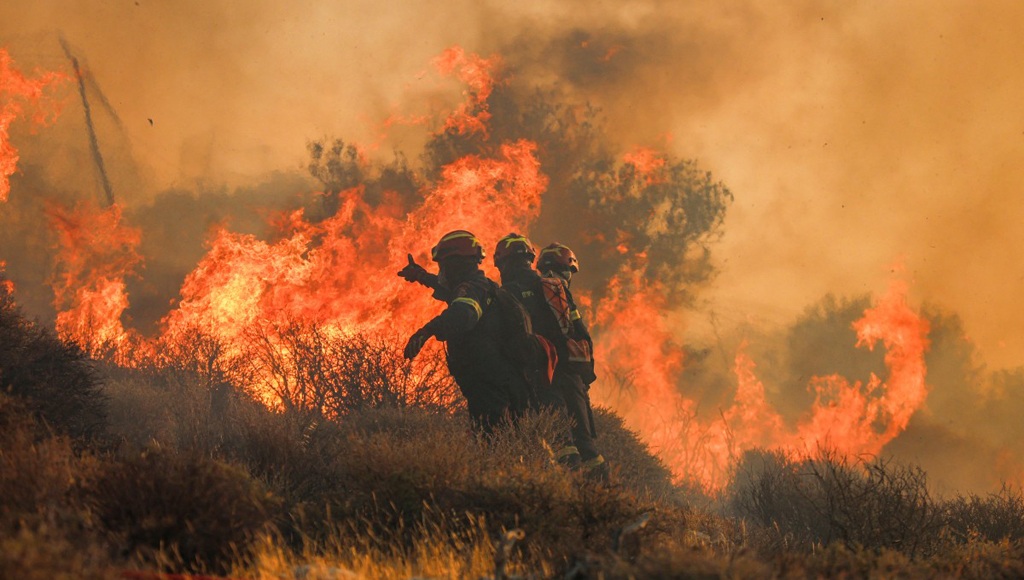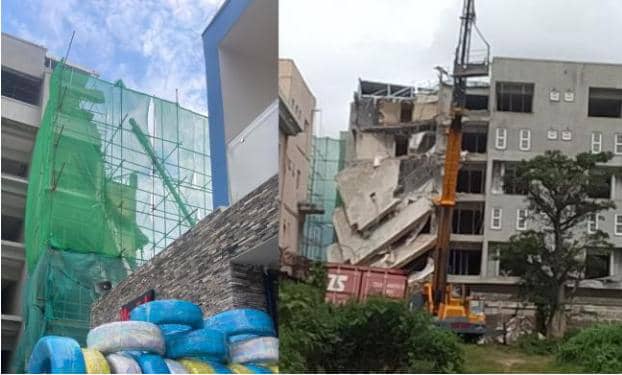News
Something Is Burning In Greece, And It Is Not Just the Forests

A devastating wildfire has swept across the southeastern region of Crete, Greece’s largest island, prompting the urgent evacuation of over 1,500 people, including residents and tourists.
The blaze, which ignited near the coastal town of Ierapetra on the evening of Wednesday, July 2, 2025, has escalated rapidly due to fierce winds and dry conditions, exemplifying the growing threat of climate-related disasters in southern Europe.
As the fire raged into Thursday, at least 230 firefighters, including reinforcements from Athens, were deployed in a desperate bid to contain the flames.
Local officials report that three settlements had to be completely evacuated.
Many of the evacuees, including those suffering from respiratory issues, were taken to health centers or sheltered in an indoor stadium in Ierapetra.
Crete’s Deputy Civil Protection Governor, George Tsapakos, described the scene as chaotic and dangerous.
“Three settlements were evacuated and more than 1,000 people left their homes.
“Some were taken to health centres with respiratory problems,” he told national broadcaster ERT.
The scale and speed of the fire, he added, were worsened by gale-force winds.
Vice-Prefect Yannis Androulakis confirmed the fire had developed multiple active fronts, rapidly consuming scrubland and cultivated fields.
“The winds are very strong, up to nine on the Beaufort scale,” he explained in a televised interview.
These hurricane-level gusts have rendered firefighting operations significantly more difficult.
Overnight efforts were further hindered when water-bombing aircraft were unable to access the fire zones due to treacherous flying conditions.
Firefighting teams have since deployed drones and at least 10 helicopters in a continued aerial assault on the blaze.
The Greek Fire Service issued a high-alert warning on Thursday.
It cautioned that the wildfire risk across Crete and southern Greece remains extreme due to the ongoing heatwave and strong winds.
This most recent emergency underscores the increasing vulnerability of the Mediterranean region to climate-driven disasters.
The crisis in Crete is part of a broader environmental emergency unfolding across southern Europe.
In Spain’s Catalonia region, a separate wildfire claimed the lives of at least two people.
Meanwhile, in France and Italy, authorities have reported several heat-related fatalities as temperatures soar beyond seasonal norms.
This early summer heatwave, arriving weeks ahead of the usual peak, has placed unprecedented stress on emergency services and communities alike.
Greece is no stranger to the ravages of wildfires.
The summer of 2023 was the most destructive in the country’s recorded history, with nearly 175,000 hectares (432,400 acres) scorched by uncontrollable blazes.
The extreme heat, with temperatures climbing to a record 46 degrees Celsius (115 degrees Fahrenheit), transformed forests and farmlands into tinderboxes.
Even the summer of 2022, then considered the warmest ever, saw an estimated 45,000 hectares (111,200 acres) destroyed, according to environmental group WWF Greece and the Athens National Observatory.
The latest wildfire on Crete is a stark reminder of how climate change is reshaping life in southern Europe.
Higher temperatures, prolonged droughts, and stronger winds are creating the perfect conditions for fires to ignite and spread rapidly.
What once were seasonal threats have now become year-round dangers, forcing governments to rethink their approach to disaster preparedness, emergency response, and long-term environmental policy.
As firefighters continue their battle against the blaze, and evacuated residents wait anxiously for news about their homes and livelihoods, one thing remains clear:
the escalating frequency and intensity of such events is no longer an anomaly, but a grim new normal.
With climate experts warning of increasingly severe summers ahead, the situation in Crete may soon be mirrored in many other parts of Europe.
This is unless coordinated global action is taken to address the climate crisis at its root.
For Diaspora Digital Media Updates click on Whatsapp, or Telegram. For eyewitness accounts/ reports/ articles, write to: citizenreports@diasporadigitalmedia.com. Follow us on X (Fomerly Twitter) or Facebook












